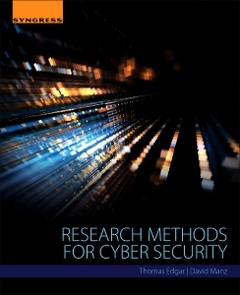Research Methods for Cyber Security
Auteurs : Edgar Thomas W., Manz David O.

Research Methods for Cyber Security teaches scientific methods for generating impactful knowledge, validating theories, and adding critical rigor to the cyber security field. This book shows how to develop a research plan, beginning by starting research with a question, then offers an introduction to the broad range of useful research methods for cyber security research: observational, mathematical, experimental, and applied. Each research method chapter concludes with recommended outlines and suggested templates for submission to peer reviewed venues. This book concludes with information on cross-cutting issues within cyber security research.
Cyber security research contends with numerous unique issues, such as an extremely fast environment evolution, adversarial behavior, and the merging of natural and social science phenomena. Research Methods for Cyber Security addresses these concerns and much more by teaching readers not only the process of science in the context of cyber security research, but providing assistance in execution of research as well.
Part I. Introduction 1. Introduction to Science 2. Science and Cyber Security 3. Starting Your Research
Part II. Observational Research Methods 4. Exploratory Study 5. Descriptive Study 6. Machine Learning
Part III: Mathematical Research Methods 7. Theoretical Research 8. Using Simulation for Research
Part IV. Experimental Research Methods 9. Hypothetico-deductive Research 10. Quasi-experimental Research
Part V. Applied Research Methods 11. Applied Experimentation 12. Applied Observational Study
Part VI: Additional Materials 13. Instrumentation 14. Addressing the Adversary 15. Scientific Ethics
David Manz is currently a Senior Cyber Security Scientist in the National Security Directorate at the Pacific Northwest National Laboratory. He holds a B.S. in Computer and Information Science from the Robert D. Clark Honors College at the University of Oregon and a Ph.D. in Computer Science from the University of Idaho. David's work at PNNL includes enterprise resilience and cyber security, secure control system communication, and critical infrastructure security. Enabling his research is an application of relevant research methods for cyber security (Cyber Security Science). Prior to his work at PNNL, David spent five years as a researcher on Group Key Management Protocols for the Center for Secure and Dependable Systems at the University of Idaho (U of I). David also has experience teaching undergraduate and graduate computer science courses at U of I, and as an adjunct faculty at Washington State University. David has co-authored numerous papers and presentations on cyber security, control system security, and cryptographic key management.
- Presents research methods from a cyber security science perspective
- Catalyzes the rigorous research necessary to propel the cyber security field forward
- Provides a guided method selection for the type of research being conducted, presented in the context of real-world usage
Date de parution : 04-2017
Ouvrage de 428 p.
19x23.4 cm
Thème de Research Methods for Cyber Security :
Mots-clés :
Adversary; Aggregation; Analysis bias; Anomaly detection; Applied experimentation; Applied observational study; Applied research; Attribution; Authentication; Axiom; Bayesian networks; Benchmarking; Black hat; Body of knowledge; Case report; Case study; Cluster analysis; Cognitive model; Cohort; Confidentiality; Consent; Continuum of discovery; Cryptography; Cyber data; Cyber security; Cyber space; Dependent variable; Descriptive study; Difference of differences; Elicitation; Empirical evidence; Emulation; Encryption; Ethical standards; Experiment replication; Experimental research; Exploit testing; Exploratory study; External validity; Failure simulation; Fair use; Fidelity; Formal model; Grey hat; Hidden Markov model; Hypothesis; Hypothetico-deductive research; Independent variable; Insider threat; Intent; Internal validity; Lemmata; Load test; Machine learning; Metric; Model validation; Null hypothesis; Observational research; Operational bounds test; Packers; Packet-capture; Paravirtualization; Performance test; Postulate; Privileges; Qualitative research; Quantitative research; Quasi-experiment; Questionnaire; Regression; Research; Risk model; Sample rate; Sampling; Scientific ethics; Scientific method; Scientific process; Sensitivity analysis; Sensor calibration; Simulation; Skepticism; Standard; Stress test; Survey; Systemic bias; TTP; Testbed; Theoretical research; Theory; Threat actor; Threat model; Threat vector; Time series; Uncontrollable variables; Validation testing; Virtualization; Vulnerability; Vulnerability disclosure; White hat



